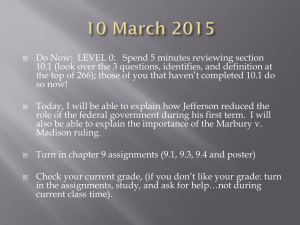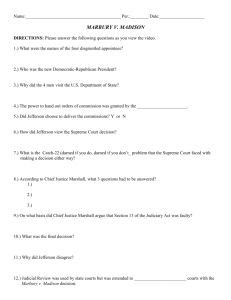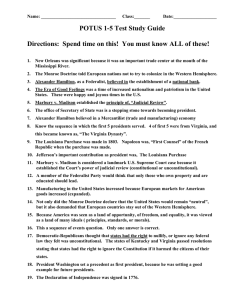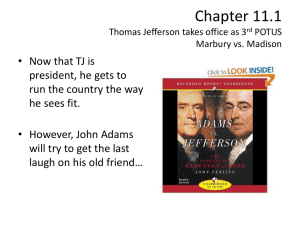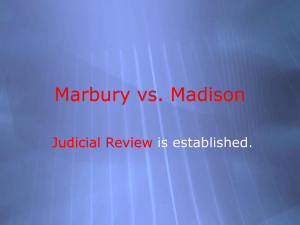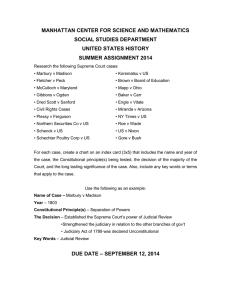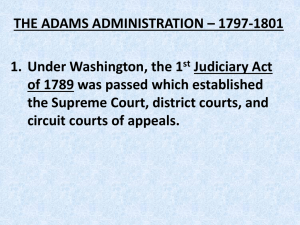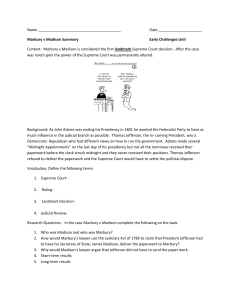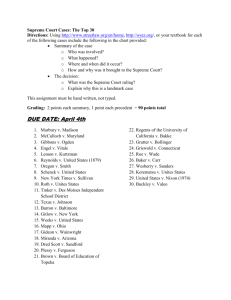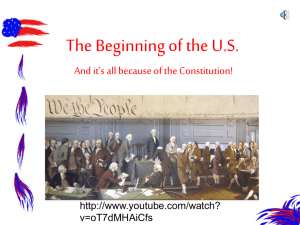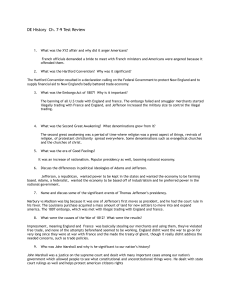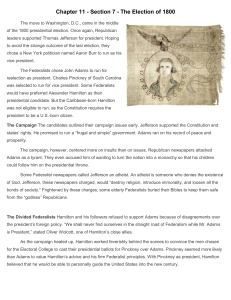Presidential Campaigning - 1800 style
advertisement
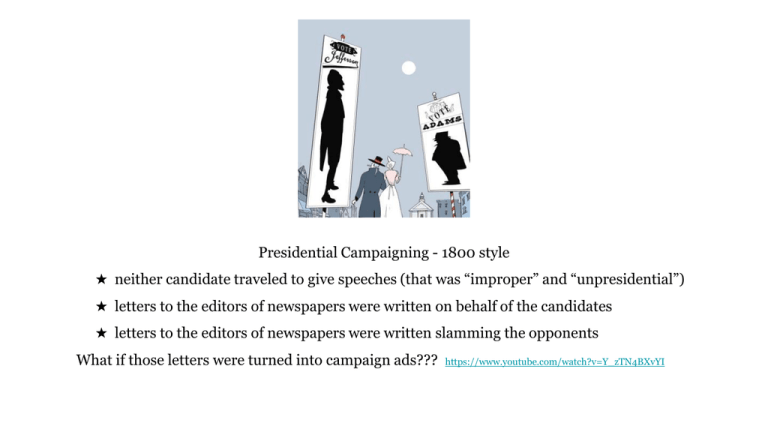
Presidential Campaigning - 1800 style ★ neither candidate traveled to give speeches (that was “improper” and “unpresidential”) ★ letters to the editors of newspapers were written on behalf of the candidates ★ letters to the editors of newspapers were written slamming the opponents What if those letters were turned into campaign ads??? https://www.youtube.com/watch?v=Y_zTN4BXvYI Regional Votes investigate the map: http://connected.mcgrawhill.com/media/repository/protected_content/COMPOUND/50000072/54/69/DOPA_SC_C10N_C10F_L1_mi1/index.html?mghCourseID=DHKCQ9C32JB823DOE3QKWEOZJQ Discuss… What did these regions have in common? Why might New York have been different? What about in today’s society? The Democratic-Republicans had a strategy… John Adams was to come in 3rd place in the electoral vote. He did. Unfortunately for them, their top two candidates were TIED in electoral votes. Jefferson was supposed to have ended up with more that Burr, that was always the plan… A tie means trouble. Because of the TIE, it was up to the House of Representatives to decide who was President and Vice President… … and there were people in the Federalist party in the House. … and they remembered how the D-R’s shut out John Adams. The Federalists plotted to ruin their plans and vote for Burr instead. Another tie… … they voted again… … another tie… 35 times they tied. 35! until one person changed his vote to Jefferson. Thomas Jefferson was now the 3rd President of the United States. ● To end presidential election confusion ● Proposed in 1803 & ratified in 1804 ● First used in the election of 1804 Renaissance Man An older term that means a person of many talents. Thomas Jefferson defined this: ❖ a scholar (studied many things like philosophy & astronomy; had a huge library) ❖ an inventor (example: clock that told time & the day of the week) ❖ a naturalist & scientist ❖ an architect (completely self-taught; designed his own home) ❖ loved the arts (played the violin) ❖ spoke six languages ❖ a writer (Declaration of Independence) ❖ a lawyer & leader (Governor of Virginia, Secretary of State, President) ❖ began a university (University of Virginia) http://www.virginia.edu/starthere Monticello - Jefferson’s home in Charlottesville, Virginia Let’s explore his home a bit: http://explorer.monticello.org/ New President, New Plan ● reduce national debt ● cut military spending ● reduce number of federal workers ● eliminate most federal taxes ● ● ● ● Judiciary Act of 1801 Sets up more federal courts Adams appoints people to be judges in the last moments of his Presidency. These judges favored Federalist ideas over Democratic-Republican ideas. To become a judge, you must receive your official commission papers. “Midnight Judges” received their commission papers “at the last minute” of Adam’s term. John Marshall The 4th Chief Justice of the Supreme Court is respected as the one who established the Supreme Court’s strong influence on the federal government. Legend has it that the Liberty Bell cracked when it was rung during his funeral. Marbury vs. Madison One “midnight judge” (Marbury) nominee did not get his appointment papers & sued James Madison (secretary of state) to deliver them. Then Marbury said the Supreme Court should make Madison deliver them. Supreme Court said that it did not have that authority & was unconstitutional. Established Judicial Review 3 principles of Judicial Review 1. The Constitution is the supreme law of the land. 2. It is the Constitution that will be followed if any other law is in conflict with it. 3. The Supreme Court has the authority to declare laws and acts unconstitutional. McCulloch vs. Maryland ● Congress does have implied powers ● states cannot tax the federal government Gibbons vs. Ogden ● federal law supercedes state law when more than one state is involved ● supported interstate commerce Worcester vs. Georgia ● states cannot regulate Native Americans… ● … but the federal government can.
